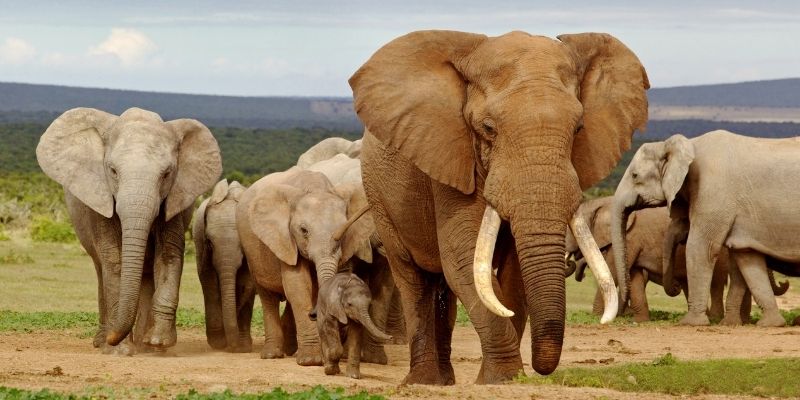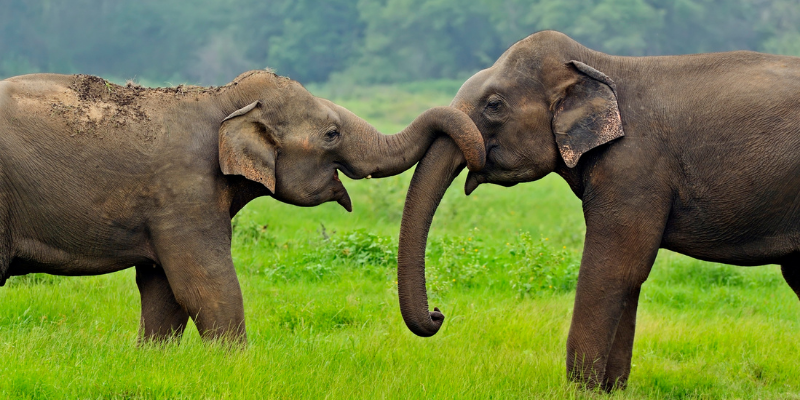What Humans Have Learnt Through Elephant Studies.
Most people adore or are at least fond of animals, so studying them sounds like a great way to spend time with the species you find fascinating or just unbelievably cute. Though, what you may not know is that studying animals is an incredibly important field of work, as it can shed light on so many things that affect the wider world.
For instance, did you know that many wildlife species in Asia and Africa would not survive without elephants? You might think they just migrate peacefully through these spaces in search of the next branch to nibble, but their presence has so much more meaning.
Elephant behaviour studies is a division of animal studies that focuses on learning about these majestic giants. The study of elephants has allowed us not only to discover just how amazing these creatures are but also how important they are for the ecosystem.
Find out just some of the incredible things humans have learnt through the study of elephants below.
They Think with Their Ears and Trunks
When we think of the way humans make decisions, the main sense we tend to use is our vision. The same can be said for primates and birds, who also use visual cues to navigate their surroundings.
Elephants, on the other hand, have been found to use their other senses over their vision to make decisions. This is because elephant behaviour studies identified that their eyesight is actually quite poor in comparison to other species.
Humans and Elephants are Quite Similar
While on the surface of things humans and elephants couldn’t look any less alike, in a lot of ways they are actually quite similar. Despite diverging from a common ancestor over 60 million years ago, studies on elephant cognition have shown that both elephants and humans share some of the same markers of intelligence today.
This includes empathy and complex cooperation, which has been thought to be because both we and the elephants had to evolve to be smart, as survival in our native environments required intellect. Both our complex thinking abilities are also thought to be necessary because elephants and humans have similarly complex social lives!
Elephants Get Emotional
The myth that being big and strong makes you more immune to emotions couldn’t be further from the truth when it comes to elephants. Further studies into elephant empathy discovered that these goliaths are extremely emotional.
Elephant behaviour studies have proven they feel everything from joy to anger, compassion, love and grief. The study of elephants has shown that their emotional attachment to their family could even be as strong as our own.
When they are happy, they will play games and express themselves joyfully in the way they greet their kin. When new elephants are born, the herd will trumpet and bellow in excitement, when distant relatives are reunited, they will rush to meet each other with great anticipation.
They hold an unbelievable amount of love for each other and will put themselves in harm's way to protect the herd. When a member dies, they will mourn and, in some cases, have been known to visit their dead many years after passing.
Sadly, they also feel many negative emotions too. The study of elephants has proven their ability to feel terror, rage and stress. In many instances, the rise in aggressive behaviour from elephants towards humans has been linked to the growing threat from humans to their kind. Elephant studies have identified this is because they can suffer a form of Post Traumatic Stress Disorder from attacks and negative experiences they have had.

They are Also Rather Intelligent
Besides being highly emotional, elephants have also been shown to be great problem-solvers too. Elephants have demonstrated that they will consciously cooperate when a task requires more than one elephant to be a success.
Elephants are one of the few species who can recognise themselves in a mirror too. This indicates they have the cognitive capacity to recognise that they are their own entity. An ability only eight other species have been found to possess.
They Are a Keystone Species
In addition to being smart, compassionate animals, the study of elephants has unearthed just how important they are in nature. They are considered to be so important to the survival of life around them, that they are considered a keystone species.
Among many things, this is because they:
Help Plant Life to Grow
By eating so much vegetation and travelling great distances, elephants disperse plant seeds far and wide. This helps plant life to grow in new areas and have more of a chance to survive in harsh climates, without the help of other pollinating species.
Provide Food for Others
Elephant dung is a nutritious source of food for numerous creatures, but especially the dung beetle. Besides living off their waste, elephant dung also makes a great nest for dung beetle larvae, which feeds numerous other wildlife in the area.
Keep Everyone Hydrated
Using their feet, trunks and tusks, elephants are able to dig wells that tap into underground water sources that would otherwise be inaccessible. This helps keep other wildlife hydrated in the harsh dry seasons.
Enable New Life to Thrive
By trampling vegetation and feasting on overgrown bushes and trees, elephants allow new life to thrive in areas that either wouldn’t see sunlight or would be too dense to inhabit.
You can find out more about how elephants help the ecosystem thrive in our blog.

Elephants Are Endangered
Sadly, one of the key things the study of elephants has identified is that elephants have been and still are at risk of endangerment.
Habitat loss and the ivory trade have been huge contributors to their decline. This among other threats has seen elephant numbers in Africa and Asia plummet in previous years. Conservation efforts have helped steady the decline and enable some communities of elephants to grow once again, but more help is needed.
In Asia especially, native elephants are still seriously in decline. Today, there is thought to be less than 50,000 wild Asian elephants left in the wild, which has resulted in them being officially listed as an endangered species.
Study Elephants Online
The best way to help elephant numbers grow and thrive is to raise awareness of the threats against them and contribute to the work that aims to save them.
You can do this by studying elephants in detail, to learn exactly what affects them, what they need to survive and how people can ensure their welfare today. With this knowledge, you can work in a role that directly supports elephant populations, be it in a zoo, safari park or through conservation efforts in Asia and Africa.
The online Elephant Studies Level 3 Award (RQF) provided by Stonebridge Associated Colleges will equip you with essential elephant-related knowledge. This includes everything from their evolution to the current conservation efforts surrounding the elephant species. You will also gain a thorough understanding of their behaviours, common health problems they can experience and how to properly care for them in captivity.
By opting to study online, you can gain this recognised qualification from the comfort of your own home. Or from wherever you prefer to learn so long as you have an internet connection. You can also work through the course as quickly as you like, making completion possible in a matter of months.
Find out more by calling our Course Executives today, they can run through the modules you will cover, what this course can lead to and answer any other questions you have about becoming a Stonebridge student.
Call them now on 0121 392 8288 or contact them online.




